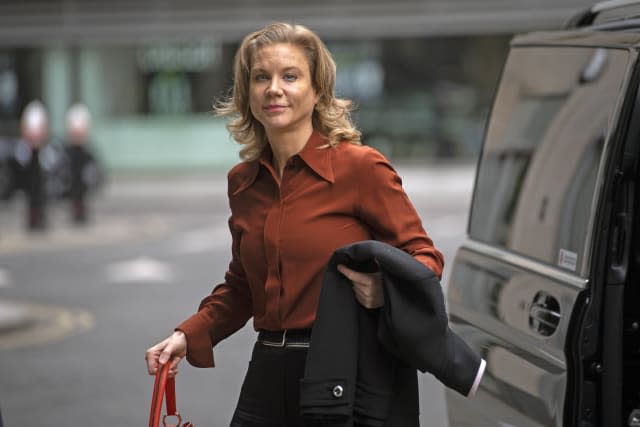Businesswoman in £1.6bn High Court battle with Barclays says she was lied to

A businesswoman embroiled in a £1.6 billion High Court battle with Barclays has told a judge she was lied to and misled when negotiating investment deals during the 2008 global financial crisis.
Amanda Staveley says her private equity firm, PCP Capital Partners, was not treated fairly and is owed money for work it did setting up a Middle East investment deal with the bank 12 years ago.
She told Mr Justice Waksman that Roger Jenkins, a then Barclays boss she had discussions with, told her that PCP was getting the same deal as Qatari investors involved in different negotiations.

But Ms Staveley, who in recent months has been involved in brokering a deal which could see a Saudi consortium take control of Premier League football club Newcastle United, said that was not true.
She said Mr Jenkins did not tell her that Barclays was paying additional fees of £346 million to Qatari investors, and a £2 billion loan to the State of Qatar.
Ms Staveley says that loan was “concealed” from the market, shareholders and from her firm.
PCP is suing the bank and wants £1.6 billion damages.
Barclays disputes PCP’s claim and says it is made of “sand”.

Ms Staveley outlined her evidence in a written statement and told how she had learned about “secret fees” in 2013.
“The first I heard of any additional fees paid by Barclays to Qatar in relation to the October 2008 Capital Raising was when I read a press article in the summer of 2013,” Ms Staveley said, in a written witness statement.
“I did know, however, that the payment by Barclays of any additional fees to Qatar ran totally contrary to the statements that Qatar was getting ‘the same deal’.”
She said she realised that “Mr Jenkins lied to me” about the terms on which Qatar was investing in Barclays.
Mr Justice Waksman began overseeing the trial, which is being shown online and is expected to last two months, at the High Court in London on Monday.
Ms Staveley began giving evidence on Thursday and is expected to be in the witness box until late next week.
She told the judge that she had a “good recollection” of most conversations and meetings and said some meetings and conversations with representatives of Barclays were “memorable”.
The Government had bailed out RBS and there were rumours that ministers might force a similar bailout on Barclays, she said.
Ms Staveley said Sheikh Mansour had “expressed an interest” in investing in a UK bank during the summer of 2008.
She said her “feedback” to him had been that: “We should only take a stake in Barclays when the Treasury is about to walk through the door.
“My plan was to offer Barclays, subject to financial due diligence, sufficient capital to satisfy its immediate Tier 1 Capital needs, on terms that were better than those I believed were being offered by the UK Government for ‘bailout’ money,” she said.
“In order to fund the proposed investment in Barclays, I knew I would need to put together a group or syndicate of investors. I was keen to find a ‘cornerstone’ investor.”
In February, Mr Jenkins and two other former Barclays bosses were cleared of fraud over a £4 billion investment deal with Qatar at the height of the banking crisis.
The Serious Fraud Office had alleged that lucrative terms given to Qatar were hidden from the market and other investors.
But Mr Jenkins, Thomas Kalaris and Richard Boath were acquitted by jurors following a trial at the Old Bailey.
A barrister leading PCP’s legal team outlined the firm’s claim, and made allegations against Barclays, at the start of the trial.
Joe Smouha QC said the claim arose out of the recapitalisation of Barclays during the financial crisis in October and November 2008.
Mr Smouha said PCP had introduced a Middle Eastern investor, His Highness Sheikh Mansour bin Zayed Al Nahyan of Abu Dhabi, to Barclays and “subscribed” to invest £3.25 billion.
He said the only other “strategic investors” were the state of Qatar and its prime minister Sheikh Hamad Bin Jassim Bin Jabr Al-Thani.
But he said PCP had been induced to invest on “manifestly worse terms” than the Qatari investors.
Mr Smouha said the Qatari investors had demanded and, in order to obtain the investment, Barclays had agreed to pay: an additional fee of £280 million; a “yet further fee of £66 million”, and to provide “an entirely unsecured loan” of £2 billion.
He told the judge: “Barclays deliberately misled not only PCP but also its own shareholders and the market in this regard.”
Lawyers representing Barclays have described PCP’s damages claim as “opportunistic and speculative”.
They say “PCP in fact made no loss”.
Jeffery Onions QC, who is leading the Barclays legal team, has described PCP’s claim as “made of sand”.
He says Ms Staveley’s evidence is not supported by documentation.


